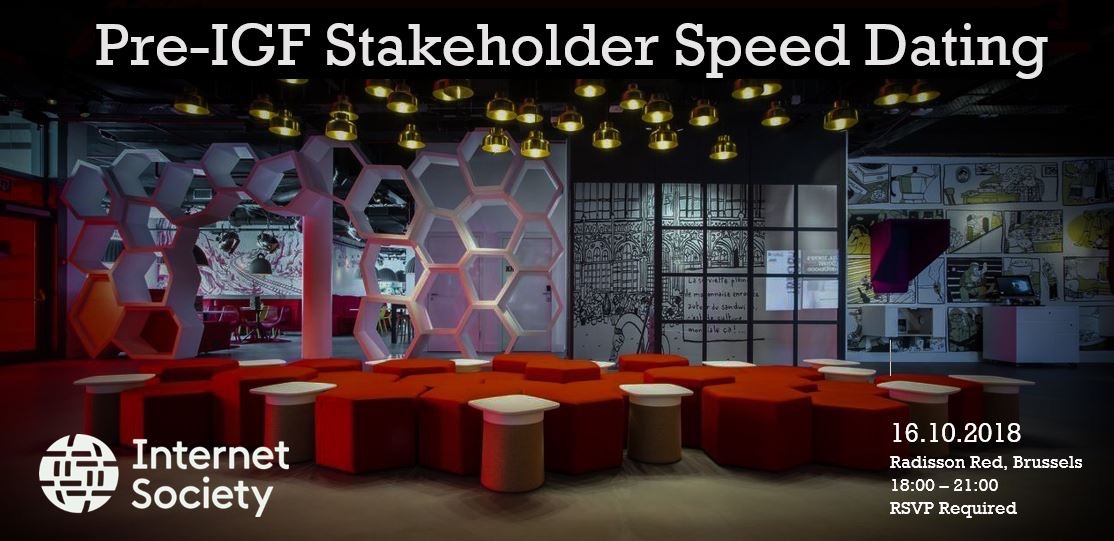In about a month, some of the key stakeholders in Internet Governance will come together in Paris and talk about the public policy challenges facing the Internet in 2018 and beyond. They will do so at the Internet Governance Forum, a UN-supported platform that will meet for the thirteenth time this year.
The IGF traditionally brings different groups of stakeholders into a large conference centre, and provides for the opportunity for these different stakeholders to discuss: the idea being that understanding, consensus and collaboration will emerge between these different communities.
Join us for a pre-IGF stakeholder networking event on Tuesday, 16 October in Brussels. Learn more and register!
Multistakeholderism: a vivid term with many meanings
The IGF model of multistakeholderism is one of a plethora of different approaches to engaging with actors beyond states in questions of global governance. Some rely more on governments, other processes rely on technical expertise, others have come and gone. Others, like the Internet Society, tend to refer to multistakeholder approaches, rather than one model.
Many observers tend to think this concept was invented by the Internet community, but shaping (global) policy through direct engagement with stakeholders has been an integral part of a range of different policy fields for a long time. In environmental policy, labour relations, and forestry management to name but a few, one of the key questions asked by policymakers has been “how can we develop globally-relevant, fair, legitimate and efficient policies?” The conclusions drawn policymakers often included the strengthening of participatory governance mechanisms, which is where multistakeholder approaches step in. These approaches try to answer the ‘who’ (participation), ‘why’ (purpose), and ‘how’ (process) questions differently from how governments of flesh and steel would normally answer them.
For better or worse, the IGF is one of the biggest platforms for Internet Governance. The IGF undoubtedly serves a purpose at this moment, and is very useful for many of its participants. However, we have been talking about its reform for a while now, and even longer.
What needs to happen?
Does the IGF need another grand review? There are many things that could be done to generate a new momentum behind the IGF. These are not new and do not address all the problems, but as a whole, these elements may work to help us consider some of the ‘who’, ‘how’ and ‘why’ questions that still linger around the IGFs and other multistakeholder fora.
- Sort out our calendars. First of all, this IGF takes place at a time when an increasingly important number of ‘competititors’ will also be discussing Internet Governance. For example, the ITU’s Plenipotentiary is taking place at the same time as the IGF.
- Give it time. The IGF also has no day zero this year, to enable different groups to organise fringe events and coordination meetings. Hence, meetings like the Brussels pre-IGF meeting, on 16 October are incredibly important to allow for people to share information prior to the meeting itself.
- Work out who does what. Other venues are also venturing into the IGF space, with the UN Secretary General’s High Level Panel on Digital Cooperation recently having been announced, amongst others. So, we see a collection of different fora being (re-)established to focus on Internet Governance. Rather than a threat, this is actually an opportunity to think about the next thirteen years of the IGF: a little competition is actually a good thing.
- Get real. The IGF has often been touted as the opportunity to gather the world’s Internet community together to discuss how the Internet should be governed. This gargantuan task is not an easy one. What can the IGF actually achieve? The expectations of the forum need to be clearly set out, so that all stakehholders can share the same aim, and then work to deliver it.
- Focus. It may be useful to generate common themes and threads for discussion across IGFs, so that reporting, discussion and measurement can be continuous and tell a coherent and consistent story from one IGF to the next.
- Make much better use of the NRIs. National and Regional initiatives can feed into discussions at the IGF in a far more constructive way. They can also be platforms to push outcomes from the IGFs.
- Ensure all stakeholders are involved. IGFs tend to be open spaces, but that does not mean that self-exclusion, ignorance, or what I have heard termed ‘exclusion by acronym’ does not exist. Despite the diverse and broad nature of the subjects discussed at the IGFs, much of the entrepreneurial community is not present at these discussions; and their discussions on these topics go on in parallel in other spaces, such as this one. Furthermore, if states want the IGF process to be as legitimate as possible, they also need to engage fully in the events.
Join us for a pre-IGF stakeholder networking event on Tuesday, 16 October in Brussels. Learn more and register!

